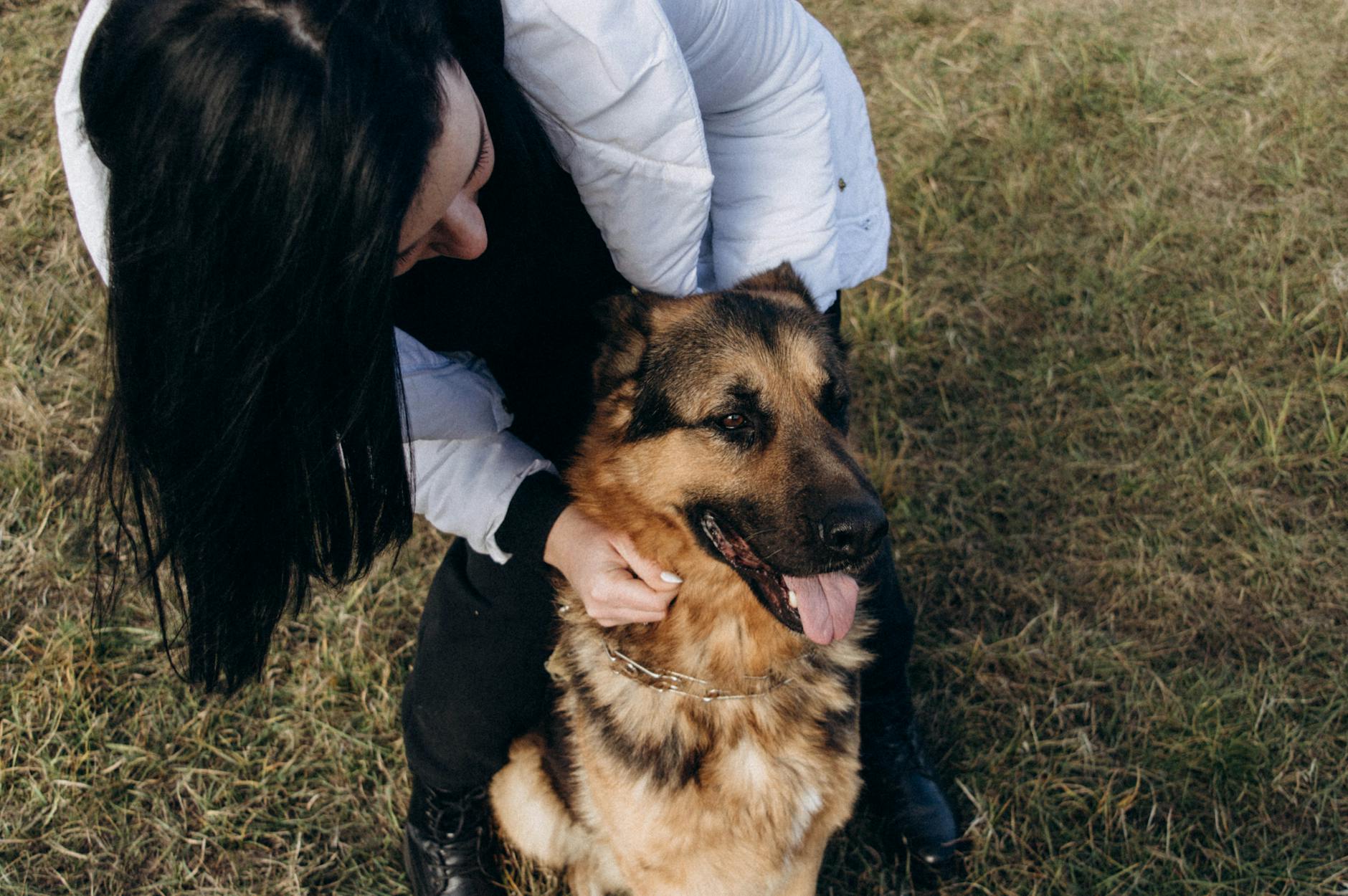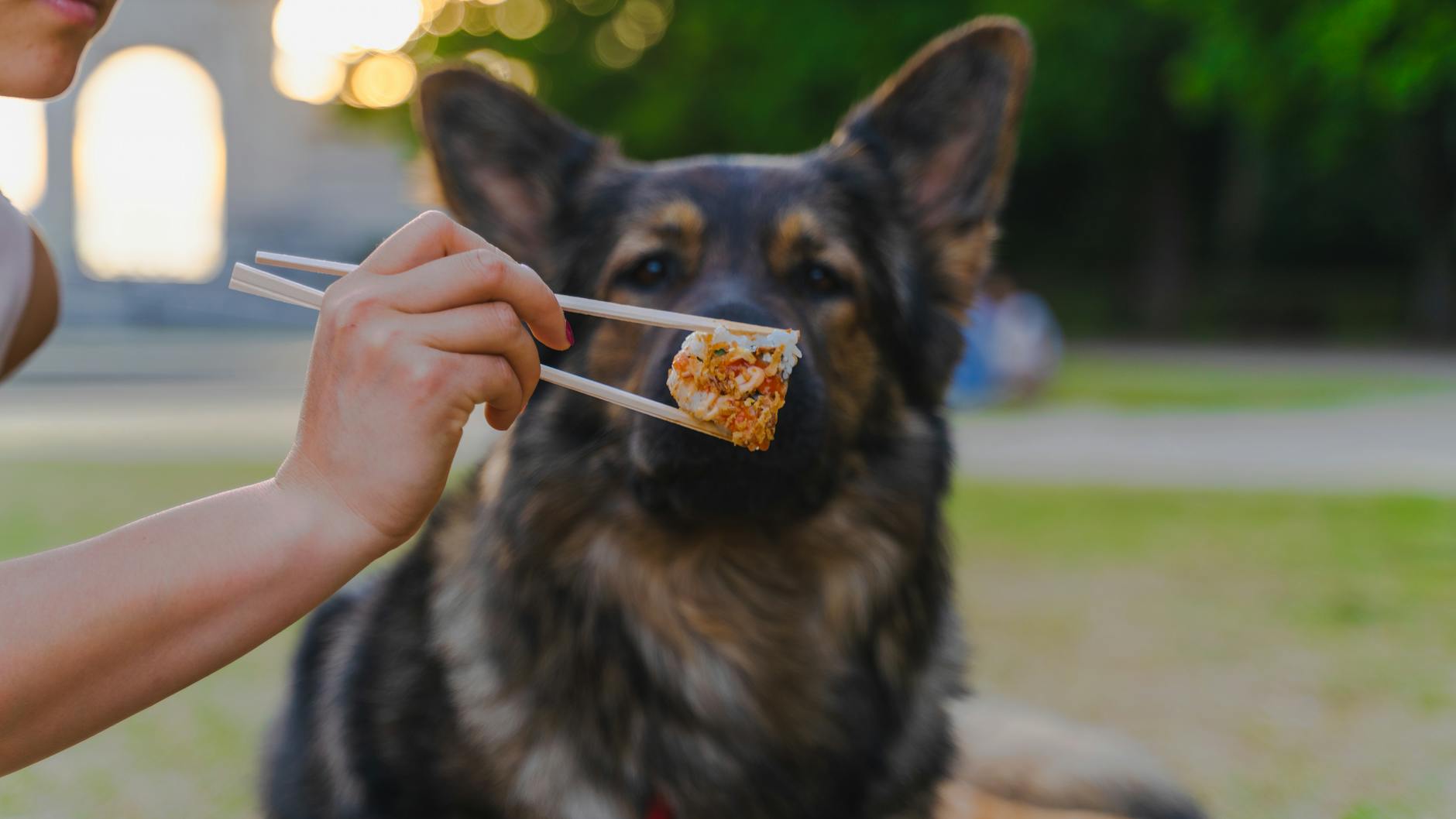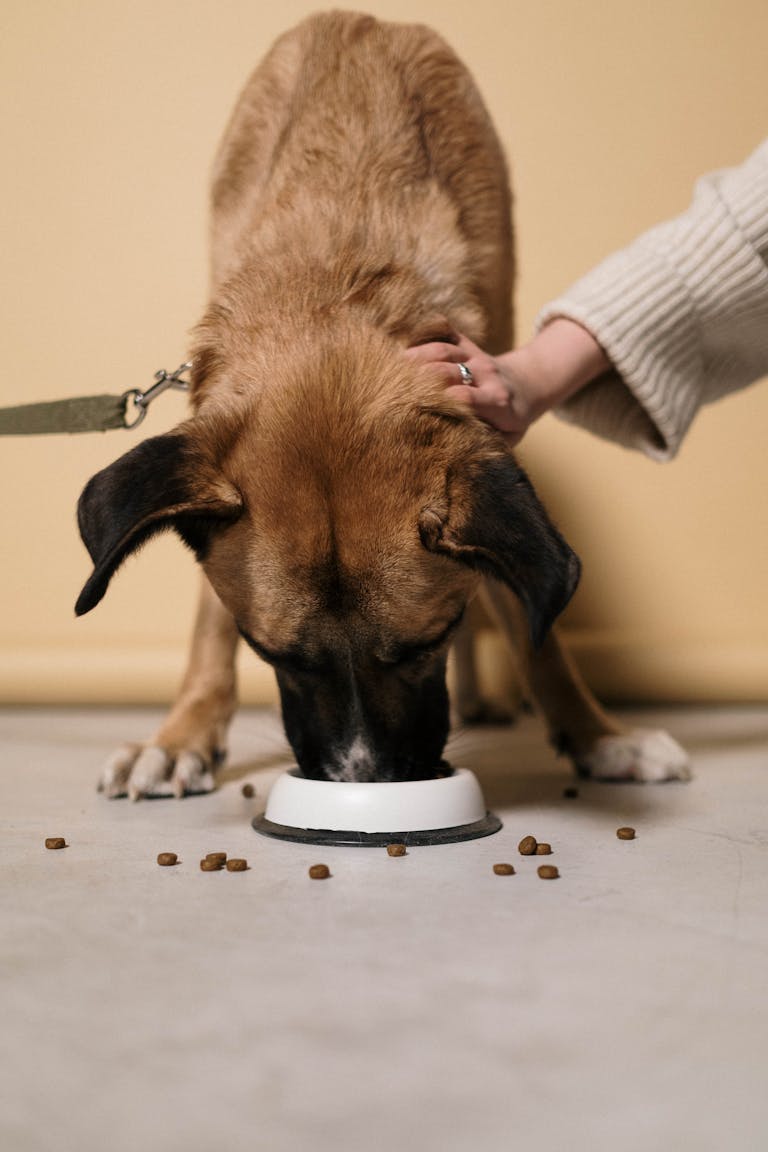Best Dog Food for German Shepherds: Top Picks and Expert Nutrition Tips

Best Dog Food for German Shepherds. German Shepherds are energetic, muscular dogs with specific nutritional needs to keep them healthy. Their diet should fuel their active lifestyle while supporting joint health and maintaining a shiny coat.
Choosing the right food can help prevent health issues, improve digestion, and even boost their lifespan. Not sure where to start? Learn which ingredients matter most and how to select the best options for your German Shepherd’s unique requirements, such as those mentioned in Best Dog Food For Every Breed: Tailored Nutrition 2024.
Table of Contents
Understanding German Shepherd Nutritional Needs
German Shepherds are a lively, robust breed with unique nutritional needs. Meeting these requirements ensures optimal energy levels, coat shine, and overall health. Understanding the essential components of their diet is key to supporting their active lifestyles and long-term wellness.
Importance of High-Quality Protein
Protein isn’t just an ingredient; it’s the foundation of a German Shepherd’s diet. This nutrient fuels muscle growth, repairs tissues, and sustains their energy. Without enough high-quality protein, you might notice muscle loss or decreased stamina in your dog over time.
- Why does protein matter? German Shepherds are naturally athletic, and their protein needs are higher than those of smaller, less active breeds. Adult dogs should aim for 18-22% protein to maintain a healthy physique. Puppies require even higher levels to support rapid growth and development.
- Stick to lean, digestible protein sources like chicken, fish, or lamb. These options meet their dietary demands and are gentle on their stomachs, a common concern for this breed.
For more detailed guidance on protein intake, consider exploring Dog Protein Requirements 2025 – Dog Nutrition Guides.
Essential Vitamins and Minerals
German Shepherds thrive when their diet includes a balance of vitamins and minerals. Their immune systems, skin, and coat can suffer without these nutrients.
- Vitamin E: A powerful antioxidant, Vitamin E supports their immune health and helps maintain a glossy coat.
- Omega-3 and Omega-6 fatty acids are essential for reducing inflammation, promoting joint health, and enhancing the condition of your pup’s skin and fur.
- Calcium and Phosphorus: These minerals strengthen bones and teeth, which are essential for active dogs like German Shepherds.
Add fish oil or a veterinarian-recommended supplement to their meals to enhance coat quality and boost cognitive health. Check out Healthy Eating for a German Shepherd to learn more about crafting balanced diets.

Photo by Julissa Helmuth
Joint Support Requirements
German Shepherds are predisposed to joint issues, especially as they age. Supporting joint health is crucial for their mobility and overall well-being. This is where glucosamine and chondroitin come into play.
- Glucosamine: Known for reducing inflammation, glucosamine supports joint cartilage health and eases mobility issues in older dogs.
- Chondroitin: This compound works alongside glucosamine to protect cartilage and increase joint comfort.
Are you noticing stiffness in your dog or hesitance to climb stairs? These could be early signs of joint problems. Feeding them high-quality kibble that includes joint supplements or adding such supplements to their diet can help alleviate symptoms. For more details on keeping German Shepherds active, look at Meal Planning For Dogs With Special Diet Needs 2025.
Ensuring your German Shepherd gets the right balance of nutrients can improve their quality of life and keep them thriving for years.
Best Dog Food Options for German Shepherds
Feeding your German Shepherd the right food is a critical step in ensuring their energy, health, and happiness. With their unique needs, it’s crucial to choose the best food that caters to their size, activity level, and digestive sensitivities. Below, we’ve broken down some of the best options, whether you prefer dry, wet, or even homemade dog food.
Top Dry Dog Foods for German Shepherds
Dry food, or kibble, is a convenient and shelf-stable option for German Shepherds. The best dry dog foods are protein-rich, provide joint support, and promote healthy digestion.
Here are some top choices to consider:
- Orijen Original Dry Dog Food: Known for its high protein content, this kibble mimics a natural diet with premium animal ingredients. It supports agile, muscular dogs like German Shepherds.
- Royal Canin German Shepherd Dog Food: Specifically formulated for the breed, this kibble aids in digestion and joint health.
- Purina Pro Plan Sport: A high-performance option that provides balanced nutrition for active dogs.
High-protein options like these help German Shepherds maintain their muscular build and energy levels. Check out Best Dog Food For Every Breed: Tailored Nutrition 2024 for more insights.
Best Wet Dog Foods for German Shepherds
Wet food is another excellent option, especially for dogs who need extra hydration or prefer a richer flavor. Its moisture content can help improve digestion, making it a great choice for German Shepherds with sensitive stomachs.
Leading wet food brands include:
- Hill’s Science Diet Wet Dog Food: Packed with veterinary-recommended nutrients, it supports weight management and muscle maintenance.
- Blue Buffalo Homestyle Recipe: This option includes natural ingredients like real chicken and brown rice, which is ideal for picky eaters.
- Merrick Grain-Free Wet Dog Food: Known for its hearty recipes, it provides essential nutrients without grains or artificial additives.
Adding wet food as a supplement to kibble can offer your dog variety and ensure proper hydration.

Photo by Summer Stock
Homemade Dog Food Recipes
If you enjoy cooking, homemade meals can be a highly nutritious and personalized option for your German Shepherd. These recipes allow you to control the ingredients, ensuring your dog receives wholesome, natural, and balanced meals.
Here are a few suggestions:
- Chicken and Rice Recipe: A simple dish combining lean protein, energy carbs, and optional vegetables for added nutrition.
- Beef Stew for Dogs: Use beef with potatoes, carrots, and green beans for a hearty meal.
- Turkey and Sweet Potato Mash: A hypoallergenic recipe featuring lean turkey and sweet potatoes, ideal for dogs with allergies.
Explore Homemade Dog Meal Recipes: Healthy, Easy, and Delicious Options for more homemade food ideas.
Grain-Free Versus Grain-Inclusive Diets
Deciding between a grain-free and grain-inclusive diet depends on your dog’s specific health needs and preferences. Here’s a quick breakdown of both:
Grain-Free Diets:
- Pros: Suitable for dogs with grain allergies or sensitivities. It often includes alternative carbs like sweet potatoes or lentils.
- Cons: Some studies have linked grain-free foods to heart conditions in dogs. Always consult your vet before switching.
Grain-Inclusive Diets:
- Pros: Easier to digest for most dogs and includes natural energy sources like rice and oats.
- Cons: It may not suit dogs with gluten sensitivities or allergies.
Both options have their merits, and the right choice largely depends on your German Shepherd’s overall health and dietary requirements. Before deciding, consider advice from experts like The Best Food for a German Shepherd | Happy Dog Training.
Special Dietary Considerations
German Shepherds often require tailored diets due to their predisposition to specific health issues. Whether dealing with allergies, weight management, or digestive concerns, making the right dietary choices can significantly improve their quality of life and overall wellness.
Food Allergies and Sensitivities
Does your German Shepherd constantly scratch, chew their paws, or experience chronic ear infections? These could be signs of a food allergy or sensitivity. Common allergens include chicken, beef, dairy, and wheat. Detecting these allergies early is crucial to preventing prolonged discomfort for your pup.
If you suspect a food allergy, consult your vet about switching to a hypoallergenic diet. These usually contain novel protein sources such as duck or venison and avoid common allergens. Grain-free formulas or limited-ingredient diets can also help identify and eliminate problematic ingredients.
Symptoms to watch for:
- Persistent itching around the face, paws, and anus
- Recurring skin infections
- Digestive issues like vomiting or diarrhea
Check out Food Allergies in Dogs and Dog Food Allergies | AKC for more in-depth information.

Photo by Pixabay
Managing Weight and Obesity
Keeping your German Shepherd at a healthy weight is key to their overall well-being. Overweight dogs face increased risks of joint issues, heart disease, and diabetes. If your pup starts to look a little less lean, it might be time to reevaluate their feeding routine.
Here are some actionable tips for managing their weight:
- Measure portions accurately: Overfeeding is the leading cause of weight gain. Use a measuring cup to ensure you’re serving the correct amount.
- Choose weight-control formulas: Look for options high in protein and fiber but low in calories. These help keep your dog satiated without overloading them with energy.
- Limit treats: Treats should make up no more than 10% of their daily caloric intake.
- Incorporate vegetables like green beans or carrots as low-calorie snacks.
Regular exercise, such as brisk walks or fetch in the yard, is essential for maintaining a healthy weight. For more guidance, visit Obesity and Weight Management Tips.
Supporting Digestive Health
German Shepherds are notorious for their sensitive stomachs. Prioritizing digestive health can prevent discomfort caused by upset stomachs, bloating, or irregular bowel movements. One way to support gut health is by including prebiotics and probiotics in their diet.
What’s the difference?
- Prebiotics are dietary fibers that feed the good bacteria in your dog’s gut, helping them multiply and thrive.
- Probiotics: These are live beneficial bacteria that promote a balanced gut microbiome.
Choosing dog food with added prebiotics and probiotics can significantly enhance digestion. You can also find standalone supplements, but ensure they are vet-approved. A balanced gut improves digestion, strengthens immunity, and reduces inflammation.
To learn more about digestive health, check out What Are Prebiotics for Dogs? and Top Rated Probiotics for Dogs.
Creating a diet that addresses these common concerns can help your German Shepherd live a happier, healthier life. Contact your vet to develop a customized plan tailored to your dog’s unique needs.
Feeding Guidelines for German Shepherds
Proper feeding is crucial for keeping your German Shepherd healthy and full of energy. Their nutritional needs change as they grow from puppies to adults and seniors. Here’s a breakdown of feeding recommendations for each life stage, including portion sizes and frequency.
Puppies
German Shepherd puppies grow rapidly, requiring a nutrient-dense diet to support their development. During their first year, their feeding habits will differ significantly from those of adults.
How Often Should They Eat? Puppies must eat frequently to keep up with their metabolism and energy demands.
- 0-12 weeks: Four small meals a day.
- 3-6 months: Reduce to three meals a day.
- 6-12 months: Transition to two meals a day.
Portion Sizes: Puppies typically require 35-40 calories per pound of body weight daily. This ensures they’re getting enough fuel for growth and play. Adjust portions based on activity levels and guidance from your vet.
Ensure their food is high in protein (minimum 22% for growth) and includes calcium and phosphorus for bone development. For more insights, check How To Create A Dog Feeding Schedule 2025.
Adults
Adult German Shepherds need a balanced diet to maintain energy and muscular physique. They are active dogs that require precise nutrition to match their activity levels.
Feeding Frequency: Adults should eat twice a day—once in the morning and once in the evening. This helps prevent bloating, a common health issue in deep-chested breeds like German Shepherds.
- Portion Sizes: Adult German Shepherds need 2.5 to 3.5 cups of high-quality dry kibble daily,
split into two meals. Adjust this based on your dog’s weight, activity level, and whether they eat wet or dry food.
Look for foods rich in lean protein, healthy fats, and nutrients like omega-3 fatty acids for joint support. To learn more, read Healthy Eating for a German Shepherd.
Seniors
As German Shepherds age, their metabolism slows, and their dietary needs change. A senior’s food should focus on managing weight and supporting joint health.
- Feeding Frequency: Stick to two smaller meals daily
to ease digestion and prevent overeating.
- Diet Adjustments: Consider switching to a senior-specific formula. These are lower in calories and fat to avoid weight gain but
high in protein to maintain muscle mass.
Key Nutrients for Seniors:
- Glucosamine and Chondroitin: Support joint health and reduce stiffness.
- Antioxidants: Boost immunity and overall vitality.
- Fiber: Helps prevent constipation, which can concern older dogs.
Explore Dog Breed Guide: Find Your Perfect Companion for feeding advice tailored to your German Shepherd’s breed characteristics.

Photo by Liudmyla Shalimova
By understanding and adapting to the specific dietary needs of German Shepherds at each stage of life, you can help them thrive and avoid common health issues like digestive discomfort, joint problems, and obesity.
Common Mistakes to Avoid When Feeding German Shepherds
Feeding your German Shepherd correctly takes more than just filling a bowl with kibble. Their unique dietary needs mean there’s no room for shortcuts or mistakes. Avoiding common pitfalls can mean distinguishing between a healthy, happy pup and one struggling with unnecessary health issues.

Photo by Utopix Pictures Pictures
Overfeeding
Many German Shepherd owners assume their dogs need as much food as they want. This can quickly lead to obesity.
- Why it happens: It’s tempting to show love with extra servings or treats.
- Risks: Overfeeding can strain their joints, cause heart problems, or lead to diabetes.
To avoid this, carefully measure their portions based on size, activity level, and age. An active adult German Shepherd might need 2.5 to 3.5 cups of food per day, while less active dogs need less. For weight management tips, explore Worst Dog Food for German Shepherds (Food to Avoid).
Feeding Low-Quality Food
Not all dog food is created equal. Cheap, low-quality options often lack essential nutrients or include harmful fillers.
- Look out for these: Avoid foods with high amounts of artificial preservatives, fillers like corn or soy, and unnamed meat sources.
- Better option: Choose premium foods with protein as the first ingredient and added vitamins for joint and coat health.
For a deeper conversation, consider checking out the Reddit community’s discussion on what real owners feed their German Shepherds: What Do You Feed Your GSD?
Ignoring Food Allergies or Sensitivities
German Shepherds are prone to food allergies, such as sensitivities to chicken, wheat, or dairy.
- Signs to watch for: Itchiness, ear infections, digestive upset, or red, irritated skin.
- Solution: Work with your vet to try an elimination diet or hypoallergenic dog food tailored to their needs.
Switching to a grain-free diet or using protein sources like lamb or duck can reduce symptoms. Learn more from this guide on New Parents with Feeding Issues!! Help!!!!.
Serving Only One Type of Food
Mixing things up isn’t just fun for your dog—it’s necessary. Dogs benefit from a varied diet that includes proteins, vegetables, and healthy grains.
- Why it’s important: A single food routine can lead to potential nutrient imbalances.
- Pro Tip: Combine dry and wet foods or rotate high-quality kibble brands occasionally.
Just be sure to transition slowly to avoid digestive issues.
Not Adjusting for Life Stages
A growing puppy, an active adult, and a senior dog have very different dietary needs.
- Common mistake: Feeding senior dogs the same high-calorie food meant for puppies can result in unwanted weight gain.
- Good practice: Choose specific formulas for each life stage to match their changing nutritional requirements.
Avoid these pitfalls and keep your German Shepherd thriving with thoughtful feeding practices. Their health and happiness lie in your hands—or, more accurately, their bowls!
FAQs About Dog Food for German Shepherds
Deciding on the best dog food for your German Shepherd raises many questions, especially when it comes to their unique dietary needs. Here, we’ll tackle some of the most frequently asked questions to help you make informed decisions and support your dog’s health and happiness.
What Is the Best Protein Source for German Shepherds?
German Shepherds thrive on high-quality protein essential for their muscle strength and overall energy. Commonly recommended sources include chicken, fish, and lamb. These proteins are easily digestible and meet the breed’s elevated dietary demands.
Are you considering plant-based protein alternatives? While some are okay, they don’t compare to the nutritional value of animal proteins. Stick to options designed for large breed dogs for best results! Check out the German Shepherd Breed Guide for additional insights.
Can German Shepherds Eat Grain-Free Dog Food?
Yes, but it depends on their specific needs. While grain-free diets are ideal for dogs with grain sensitivities or allergies, some studies suggest potential links between grain-free foods and heart conditions in dogs. German Shepherds without grain sensitivities can safely consume grain-inclusive diets that include rice or oats.
When in doubt, consult your veterinarian to find the best balance for your pup. Learn more about this debate in discussions like “Best Dry Food for My Pup”.
How Often Should I Feed My German Shepherd?
The feeding schedule typically depends on their life stage:
- Puppies: 3–4 meals daily.
- Adults: Two meals daily.
- Seniors: Two smaller meals daily to support digestion and weight control.
Consistency is key to regulating their digestion and energy levels. For more detailed feeding tips, read “How to Create a Dog Feeding Schedule”.
How Do I Know If My German Shepherd Has Food Allergies?
Food allergies are common in German Shepherds. Symptoms may include:
- Excessive scratching or chewing of paws.
- Vomiting or diarrhea.
- Recurring ear infections.
If any of these signs appear, an elimination diet can help pinpoint the allergen. Start by removing common culprits like chicken or wheat. If symptoms improve, slowly reintroduce those foods under vet supervision to identify the issue.
Get additional perspectives in this detailed community discussion on “Dog Food Choice?”.
Are Supplements Necessary for German Shepherds?
It depends on their existing diet. Many high-quality dog foods already include essential nutrients, but German Shepherds often benefit from:
- Glucosamine and Chondroitin for joint health, especially in older dogs.
- Probiotics to support their sensitive digestive systems.
- Omega-3 fatty acids for a healthy coat and reduced inflammation.
Talk to your vet before starting any supplements to ensure they meet your dog’s unique needs. If you’re curious, have a look at The Best Food for a German Shepherd | Happy Dog Training.

Photo by MART PRODUCTION
Can German Shepherds Eat Homemade Dog Food?
Yes! Homemade meals allow full control over what goes into your dog’s diet, making it easier to avoid allergens and cater to specific needs. Popular recipes include chicken and rice, scrambled eggs with vegetables, or a beef stew mix.
Just ensure meals are nutritionally balanced—consult a vet or canine nutritionist to make sure homemade recipes cover their protein, vitamin, and mineral requirements.
Addressing your dog’s diet proactively can make a huge difference in their health and well-being. For a broader look at German Shepherd care, you may enjoy this detailed guide about raising healthy German Shepherds.
Importance of Choosing the Right Diet for German Shepherds
Selecting the right diet for your German Shepherd is a responsibility every owner must take seriously. Their unique nutritional needs greatly influence their energy levels, coat health, and overall well-being. Choosing wisely isn’t just about filling their food bowl; it’s about supporting your dog’s health and happiness for years to come.
Benefits of a Thoughtful Diet
A proper diet for your German Shepherd ensures they thrive physically and mentally. Here’s what the right nutrition brings to their lives:
- Improved Digestion: High-quality foods reduce gastrointestinal issues common in this breed.
- Better Joint Health: Ingredients like glucosamine help maintain mobility as they age.
- Enhanced Coat Condition: Omega-3 and omega-6 fatty acids keep their fur shiny and skin healthy.
- Stronger Immunity: A balanced diet packed with essential vitamins and minerals supports the immune system.
Small adjustments in food choices can lead to noticeable improvements in your dog’s daily behavior and long-term health.

Photo by Pixabay
Choosing Based on Their Age, Size, and Sensitivities
Every German Shepherd is unique, so their diet should align with their individual needs.
- Age: Puppies, adults, and seniors require different nutrients and portion sizes to match their stage of life. For more tips, refer to How To Create A Dog Feeding Schedule 2025.
- Activity Levels: Highly active dogs burn more calories and need diets rich in protein and fat.
- Health Concerns: Allergies or sensitivities to ingredients like grains or certain proteins should guide your choices.
Tailoring their food to address these needs can make every meal a customized experience. For additional insights, visit Belgian Malinois vs. German Shepherd – Dog Nutrition Guides.
Consult a Vet for Expert Advice
While general guidelines work, nobody knows your dog better than your veterinarian. A vet can recommend diets based on health conditions, current weight, and activity. Whether you’re navigating allergies, joint problems, or other breed-specific concerns, expert input ensures your feeding strategy is on point.
Remember, choosing the right diet is more than a decision—it’s a commitment to their lifelong health. To explore more food options tailored to German Shepherds, check out Healthy Eating for a German Shepherd.






